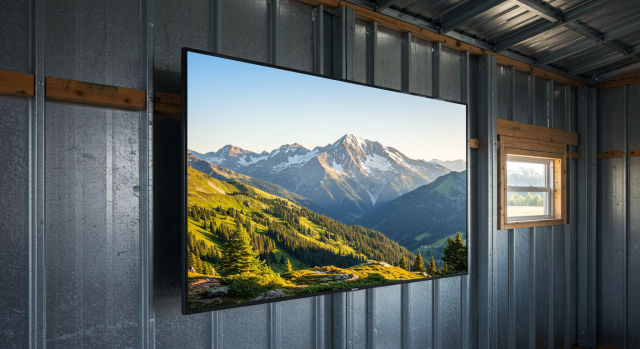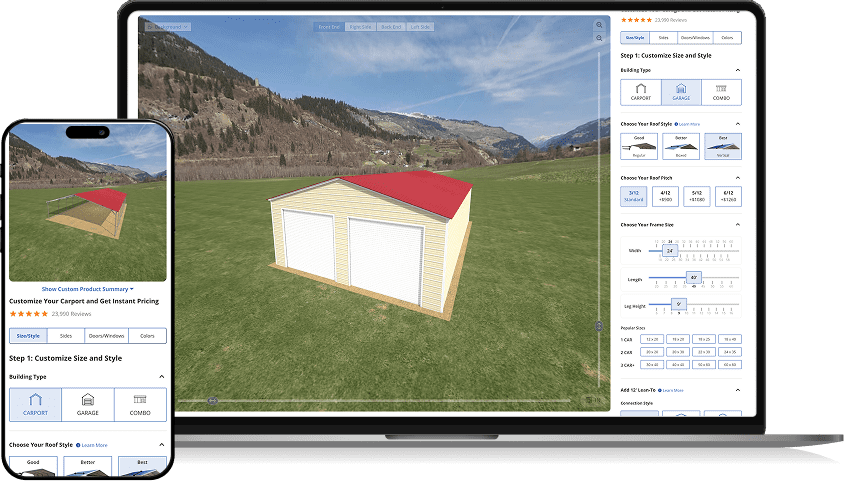Metal buildings are quite versatile. Folks use them as garages, workshops, storage sheds, and even living spaces. What’s better than adding a little zest to your space than mounting a TV?
But you already knew that because you’re here reading this post.
If you’re wondering how to mount a TV in a metal building, it’s because you know it’s not the same as hanging one on your bedroom wall.
That’s why we created this guide. It walks you through each step of the process so you can relax and enjoy your favorite shows after a couple of hours of DIY work. The guide starts by explaining why you might want to install a TV in a metal building, then moves on to planning, installing, and addressing common challenges.
Let’s get started!
Why Mount a TV in a Metal Building?
Metal buildings aren’t just for storing tractors and tools anymore. These days, people are converting them into all sorts of amazing spaces. Think man caves, she sheds, home gyms, workshops, offices, and even extra living areas.
While estimating the number of TVs per household is difficult, in 2022, 111 million households in the US connected to television monthly. That number is expected to grow to 121 million by 2027, according to Statista.
It’s clear that TVs are a big part of our lives. Why not bring that convenience and entertainment into your metal building?
Doing so opens up many possibilities:
- You can watch your favorite team while working on your car.
- Catch up on the news while potting plants.
- Or even pull every curtain and enjoy a home theater experience.
Transforming Metal Buildings into Entertainment Hubs with Wall-Mounted TVs
Imagine turning your metal building into the ultimate hangout spot. With a wall-mounted TV, you can transform any space into a place for fun and relaxation.
- Man caves & game rooms: Catch the game with your buddies, play video games, or just relax and watch a movie.
- Home gyms: Stay motivated during your workouts by watching your favorite shows or following along with fitness videos.
- Workshops & offices: Keep up with the news or have some background entertainment while you work.
- Storage spaces: Even a storage building can benefit from a TV. You can watch instructional videos while organizing or something else while taking a break.
Many of Alan’s Factory Outlet’s metal buildings, like our metal sheds and garages, are perfect for adding TVs and other amenities. This lets you create a cost-effective living or entertainment space that’s tailored to your needs.
Types of TV Mounts for Metal Buildings
You’ll find several types of TV mounts in the market. Some are better suited for metal buildings than others.
Fixed Mounts: Simplicity and Stability
Fixed mounts are the simplest type, holding your TV flush against the wall. They’re ideal for situations where you don’t need to adjust the viewing angle.
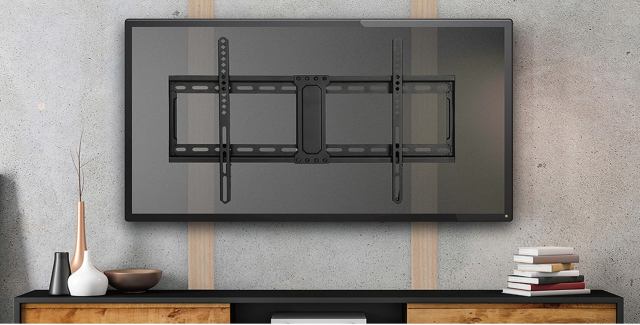
Pros
Cons
Tilting Mounts
Tilting mounts allow you to angle your TV up or down, reducing glare and improving viewing angles. This feature is useful in rooms with overhead lighting or windows.
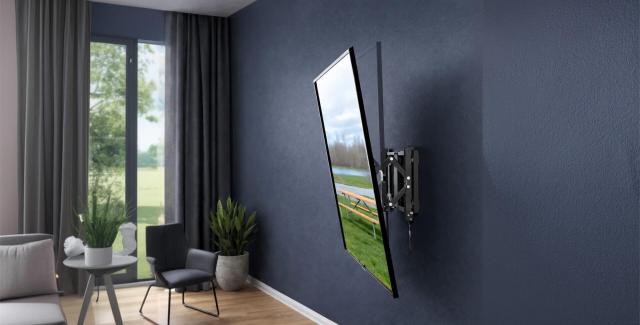
Pros
Cons
Full-Motion Mounts: Maximum Flexibility
Full-motion mounts are all about flexibility. They allow you to swivel, tilt, and extend your TV. This flexibility is perfect if you frequently move from one side of the room to another.
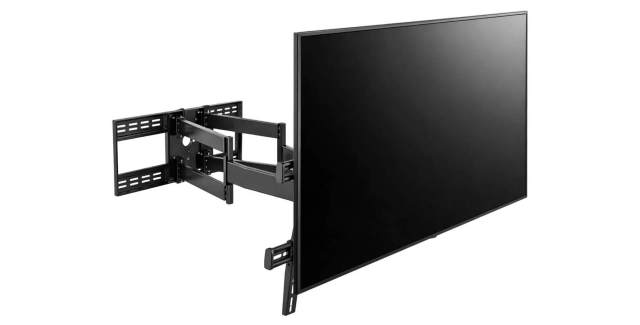
However, with larger TVs, the leverage created by this mount type can put a large amount of stress on the metal studs
and mounting hardware.
Pros
Cons
Choosing the Right Mount for Your Metal Building
As you can see, there are a few things to keep in mind when choosing a TV mount for your metal building:
- TV size and weight: Ensure the mount is rated for your TV’s size and weight.
- Viewing angle: Consider where you’ll be watching TV from and choose a mount that offers the necessary adjustments.
- Your budget: Mounts range in price, so set a budget before you start shopping.
How to Mount a TV in a Metal Building—Getting Started
Mounting a TV in a metal building is a little different than mounting one on a typical drywall wall in your home. You’re dealing with metal studs or, sometimes, just the metal sheeting itself. This means you’ll need different hardware and a slightly different approach.
Welding Vs. Bolting—Choosing the Right Option
If you’re installing a TV in a metal building with exposed metal walls and steel studs, you might be tempted to weld the TV mount directly onto the studs. While welding can create a very strong connection, it’s usually not the best option for a few reasons:
- Once you weld something, it’s there to stay. This makes it difficult to move or adjust the TV later.
- The heat from welding can weaken the metal studs, potentially compromising your building’s structural integrity.
- Welding isn’t something everyone can do.
Bolting or screwing the mount into the studs is a much better choice. It’s strong and secure, and you can adjust or remove it if you need to.
Essential Materials and Hardware You’ll Need
Before you get started, gather everything you’ll need. Here’s a breakdown of the essential materials and hardware you’ll need to install a TV in a metal building:
- A TV mount correctly sized to your TV (fixed, tilting, or full-motion).
- Toggle bolts or snap toggles to use as anchors for secure mounting in metal studs when they’re covered with drywall.
- Sheet metal screws or lag bolts for direct mounting to metal surfaces if you don’t have to deal with drywall.
- Cable management clips (optional) to keep your cable runs and installation looking nice and tidy.
Tools and Equipment for a Smooth Installation Process
Now, let’s talk tools. Having the right tools will make the installation process a whole lot easier.
Choosing the Right Stud Finder
If your metal building’s walls are finished with drywall, you’ll need a stud finder to locate the metal studs behind it. There are two types of stud finders:
- Magnetic stud finders: These use a magnet to detect the screws or nails used to attach the drywall to the studs. They’re simple to use and inexpensive, but they won’t let you easily locate the stud’s center.

Electronic stud finders: These use sensors to detect changes in density behind the wall, indicating the presence of a stud. They’re more accurate and can detect both wood and metal studs. Some models can also detect wires and pipes.
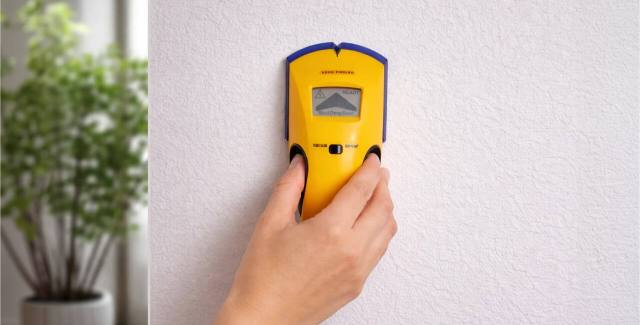
An electronic stud finder is generally the preferred option for metal stud construction. It helps you find the center of the stud more accurately, which is important for a secure mount.
Power Drill
You’ll need a good power drill for drilling pilot holes and driving screws. A cordless drill is convenient, but a corded drill will provide more power for drilling through metal.
Choosing the Right Drill Bit
Don’t use just any drill bit! You’ll need a high-strength steel (HSS) bit designed for drilling metal. Wood-drilling bits won’t cut it (pun intended!).
Here are a few more things to point out:
- Size matters: Use a drill bit slightly smaller than the screws’ or bolts’ diameter you’ll use.
- Stay cool: When drilling through metal, it’s important to lubricate the bit and cool it to prevent it from overheating and becoming dull.
Other Tools and Equipment
Here’s a short list of the additional tools you might need:
- Level (not always required)
- Screwdriver set
- Safety glasses
- Tape measure
- Wrench set
- Hammer
- Pencil
Cost of Installing a TV in a Metal Building
The cost of mounting a TV in a metal building can vary depending on a few factors. The most important factor is the TV mount you choose.
While there are basic flat, fixed-mount units for less than $10 on Amazon, you’ll also find premium options for curved TVs for as much as $2,400. However, that’s more of an exception than the norm.
Here’s a breakdown of how much it costs to mount a TV in a metal building:
| Cost Item | Cost Range |
|---|---|
| TV Mount1 | $5–$2,400+ |
| Metal stud mounting kit2 | $10–$30 |
| Labor2 | $60–$200 |
| Total | $75–$2,630 |
| New Outlet2 (optional) | $210 |
Doing it yourself (DIY) is the more budget-friendly option, especially if you already have some of the necessary tools.
How Long Does Installation Take?
This typically isn’t heavy work. A technician or electrician can install a TV in about an hour.
DIYing the project takes longer. Give yourself a bit more time, maybe 2-3 hours, especially if it’s your first time. It’s not a race, so take your time and do it right.
Step-by-Step Guide: How to Mount a TV in a Metal Building
Okay, let’s get down to business!
If you’re installing a TV in a metal building, it’s likely a smart TV, and you’ll likely use it to stream your favorite shows.
Why?
In 2024, four out of five US households owned a smart TV (source: The Current), and 45 million households (36.3%) only used them to watch broadband non-pay streaming services, a number set to increase to 59 million (46.5%) by 2028, according to Statista.

Consequently, the rest of this guide will focus on installing flat-panel smart TVs. Mounting your TV in your metal building goes through five key steps:
- Planning and preparation.
- Finding and marking the mounting points.
- Drilling pilot holes and mounting the bracket.
- Attaching the TV to the mount.
- Cable management and final adjustments.
Let’s break them down.
Step 1. Planning and Preparation
Before you even touch a tool, take some time to plan things out.
- Choose the right spot: Consider where you’ll be watching TV from. Think about the ideal viewing angle and height. Also, consider related electronics like your sound system.
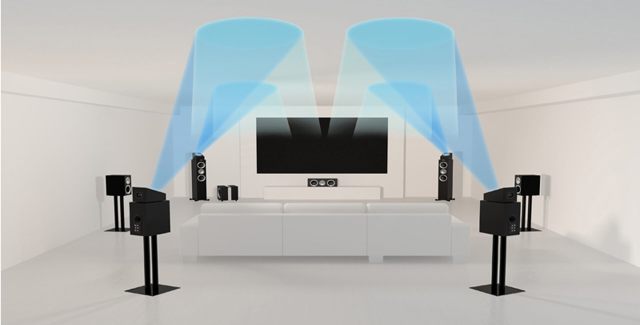
- Outlet placement: Ensure there’s an electrical outlet nearby. If not, you may need to have one installed.
- WiFi: Ensure you have good WiFi signal strength if you’re using a Smart TV.
- Check for obstructions: Make sure there are no pipes, wires, or other obstructions behind the wall where you plan to mount the TV. An electronic stud finder can help.
Step 2. Finding and Marking the Mounting Points
Now it’s time to find those studs and mark where you’ll be drilling.
If Your Walls Are Finished with Drywall
- Turn on your electronic stud finder and slowly move it across the wall. It’ll light up or beep when it detects a stud.
- Make a light pencil mark at the center of the stud. The TV mount must be installed in the stud’s dead center.
- Use the stud finder to find the edges of the stud and confirm the center point.
- Most mount kits include a paper template you can use to mark the holes without measuring.
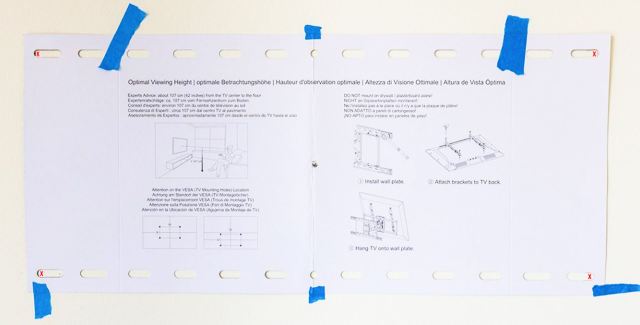
If Your Walls Are Exposed Metal
- You can see the studs, so there’s no need for a stud finder.
- Mark the center of the stud where you want to mount the TV with a tape measure and pencil.
- Use a paper template to mark the rest of the holes.
Step 3: Drilling Pilot Holes and Mounting the Bracket
It’s time to make some holes.
- Select a drill bit that’s slightly smaller than the diameter of your screws or bolts. Most snap toggle kits include a drill bit of the right size.
- Apply firm, even pressure, and let the drill do the work. Don’t force it, and remember to lubricate and cool the bit.
- Mount the wall bracket ensuring all the screw holes align properly.
Using Toggle Bolts or Snap Toggles for Secure Mounting
If you’re mounting to metal studs behind drywall, toggle bolts or snap toggles are your best friends.

Here’s how to install snap toggles:
- Drill a hole through the drywall and stud large enough for the toggle to pass through.
- Push the metal channel of the snap toggle (wings folded) through the hole until it’s fully behind the metal stud.
- Slide the plastic cap along the straps until it’s flush against the wall.
- Snap off the excess plastic straps, breaking them off even with the cap.
- Position the bracket, insert the bolt with a washer through the cap, thread it into the snap toggle, and tighten.
Mounting the Bracket Directly to Metal Studs with Sheet Metal Screws
If you’re mounting directly to exposed metal, sheet metal screws are the way to go.
- Drill pilot holes slightly smaller than the screws you’re using.
- Use your drill to drive the sheet metal screws through the mount bracket and into the metal studs. Make sure they’re snug, but don’t overtighten.
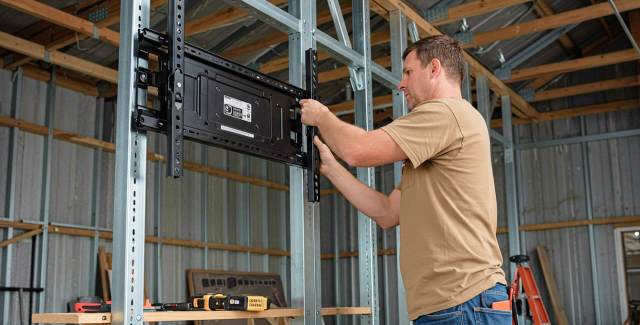
Step 4: Attaching the TV to the Mount
- Follow the provided instructions to attach the mount on the back of your TV using the provided bolts.
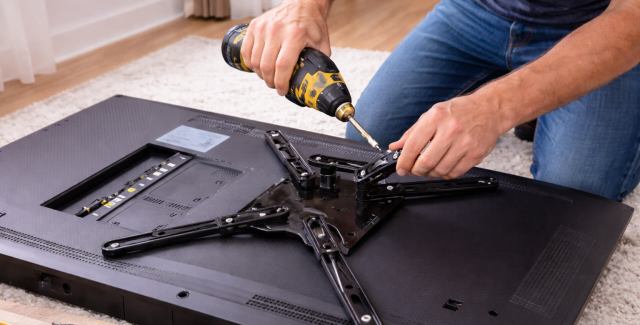
- Carefully lift the TV and align it with the mount bracket. Most mounts have a simple hook-on system.
Have a helper assist you, especially with larger TVs.
Step 5: Cable Management and Final Adjustments
Almost done! Now, it’s time to tidy up those cables and make any final adjustments.
- Use cable management clips to organize and hide your cables for a cleaner look.
- Adjust the viewing angle (depending on the mount).
- Double-check all the screws and bolts.
- Enjoy your new TV!
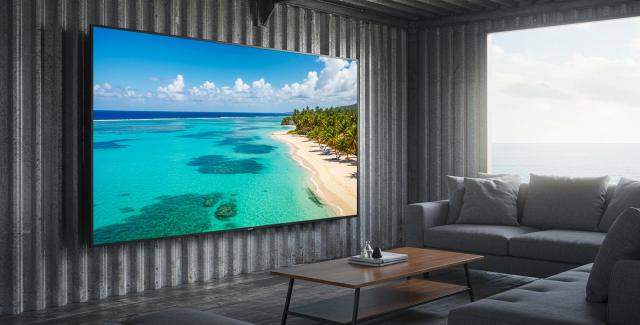
Addressing Common Challenges and Solutions
Even with careful planning, you might run into a few challenges. Here are some common issues and how to solve them:
Dealing with Uneven Metal Surfaces
You can use shims to create a level mounting surface if the metal surfaces are uneven. Metal or plastic shims work best.
Securing Larger TVs in Metal Buildings
TVs are getting larger—a survey by CNET found that a 65-inch TV is the most popular size. However, 43% of people want an even bigger TV. 30% reported 75-85-inch TVs were on their wish lists, and 10% wanted TVs that were 100 inches or more.
Extra care is needed when mounting such large TVs in metal buildings. Consider the bolts’ shear strength, anchor holding power (like snap toggles), metal stud thickness, and leverage, especially with full-motion mounts.
To prevent problems:
- Use heavy-duty hardware.
- Distribute the load on multiple anchor bolts.
- Reinforce studs if necessary.
It’s Time to Enjoy Your TV in Your Metal Building
And there you have it! You now know how to mount a TV in a metal building. Here is a recap of the installation process:
- Plan and prepare.
- Find and mark the mounting points.
- Drill pilot holes and securely attach the wall bracket.
- Carefully mount the TV to the bracket.
- Organize cables and make final adjustments.
Now it’s time to kick back, relax, and enjoy your favorite shows, movies, or games in your newly enhanced space.
Alan’s Factory Outlet offers versatile metal buildings, including sheds, carports, garages, and custom buildings. You can use these buildings for many purposes, and with a large-screen TV, you can transform them into home theaters or family rooms.
Choose a metal garage with free installation today!
